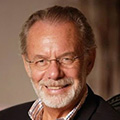Music has a special way of transcending culture, history, and even language – and that’s why it’s so universally beloved by folks, both Oklahoma-born and otherwise. The state’s long history and beautiful rolling plains have been a source for many works of art, but they’ve also served as fuel for the many, many musicians who were born there.
In this piece, we delve into some of the most popular artists to come out of Oklahoma to learn about the lives they lead, the beliefs they held, and how they impacted the people around them with their love of music.
Woody Guthrie
Woodrow Wilson “Woody” Guthrie was the artist behind “This Land Is Your Land,” arguably one of the most recognizable songs played in schools throughout the United States – but what many don’t know is his roots are in Oklahoma.
On July 14th, 1912, Woody Guthrie was born to his parents, Nora Belle Sherman Tanner, a teacher, and Charles Guthrie, a land trader and ambitious Oklahoman politician in the 1910s-1920s. Woody spent the first few years of his life accompanying his father to stump speeches, igniting a passion for activism and public speech at a very early age.
However, his distinctly middle-class upbringing came to an end as the family home burnt down and his mother fell ill. Within a span of 5 years, Woody’s life was turned completely upside-down, and he stopped attending formal education by the time he had reached high school.
As a 13-year-old, Woody had undertaken a smattering of odd jobs and lived in a group home, completely independent at this point – but he maintained his sunny disposition and love for all things creative despite being met with tragedy at every corner.
At the time, Woody also began experimenting with painting and produced many now-lost portraits. However, he also realized that songwriting was an easier way to make money – and so he chased that dream down in Pampa, Texas, at 16 years old.
Rejoining his brother, Roy, down in Texas, Woody joined a family band and began to find a sense of belonging in music – and the theme of family and togetherness would then become a central theme in much of his music.
“One of the skills that Woody brought to the table as a songwriter was his background in community singing like when he was playing with the Pampa Junior Chamber of Commerce and his early bands. He realized early on that you create a chorus that was easy to sing. The idea was to get everybody singing. You have to go back in time and realize there were no movies there is no television in small, rural communities.”
— Mary Jo Guthrie
Chapter 13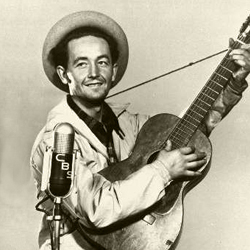
As time went on, he became a well-renowned musician, but was also considered controversial in some circles for his lyrics that often called to empower the disenfranchised and exploited – a message that some would rather have unheard. Even his most popular song, “This Land Is Your Land” was meant to be a call to question the powers that be – although at first brush, it may not seem that way.
Woody’s life was spent with other creative souls who believed their craft was more than just a good tune, and his communal lifestyle in New York and affiliations with American left-wing politics were a testament to his beliefs. This later resulted in him becoming blacklisted in his home state of Oklahoma.
At the end of his storied career, Woody Guthrie was diagnosed with Huntington’s disease and passed away at 55 years old.
Wanda Jackson
Wanda Jackson is a rockabilly country singer born on October 20th, 1937, in Maud, Oklahoma, to Nellie Whitaker and Tom Robert Jackson. Her father, Tom, was a musician in his own right but was forced to quit because of the dawn of the Great Depression, but he passed on his passion for music to young Wanda by giving her a child-sized guitar after moving the family to California.
After moving back to Oklahoma in 1952, Wanda Jackson entered a local talent contest and came out victorious, earning her a 15-minute daily spot on KLPR – which ended up being the catalyst to her wider success.
“My friends at church dared me to go up and try out. I said, you know, he wouldn’t ever let me on that show. “Yeah, I think you ought to.” So after they double-dog dared me, you know, then I had to go up. And so Jay let me be on the show a few times and then I entered a contest on the station. Whoever won got their own radio program for, I don’t know, a month, six weeks, something.
I won that contest and I got a show every day after school, 5:15 to 5:30, after the news. I guess they had a way of knowing that it was pretty popular. People were listening to it a lot. We had sponsors, so when my time was up for the contest prize, they told me my show was doing good and that if I could find and keep sponsors, they would allow me to keep that fifteen minutes.”
— Wanda Jackson
Chapter 4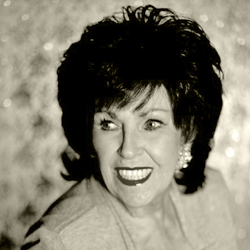
In 1954, country singer Hank Thompson heard Wanda sing and asked her to record with his band, the Brazos Valley Boys. This collaboration resulted in songs like “You Can’t Have My Love”.
In 1955, Wanda Jackson’s success reached new heights when she went on tour with Elvis Presley, who later encouraged her to explore singing rockabilly. Later, she released “Fujiyama Mama,” which became a hit in Japan. After two Grammy nominations, Wanda married IBM programmer Wendell Goodman who then gave up his job to help manage her career.
A few years into her marriage, Wanda and Wendell became Christians – a move which she later says saved their marriage. She released three gospel albums in total and continued touring all the way into 2012.
Her message to young would-be singers and performers is rooted in identifying where their passion lies:
“Those that have the talent will make it, maybe not to superstardom, but they’ll make it. I was always happy if I could just make my living singing. Naturally I wanted to be a big star, but when that wasn’t happening, I was still happy that I could sing. And I would ask them something like, “Would you be happy just singing the rest of your life in smaller places?” If they say yes, well, I’d say you should go for it.”
— Wanda Jackson
Chapter 14
Roy Clark
Naturalized Oklahoman Roy Clark was originally born in Meherrin, Virginia, on the 15th of April in 1933 to musical parents who played piano, mandolin, guitar, and banjo around the house as he was growing up – a wonderful precursor to his musical success as an adult, but his musical inclinations came to fruition long before the tours and awards.
At 14, Roy Clark started playing guitar with his father at local dances and competed against other young musicians to test his talent and mettle. As a young teen, he recalls needing to get permits to work at venues late into the night – but he enjoyed it nonetheless. Because of these long hours at nighttime venues, Roy ended up missing a lot of his schooling, but his true love was learning and playing music for himself and the people around him.
Within a few years, he scored two National Banjo Championships and eventually played at the Grand Ole Opry. Roy continued down this path and eventually garnered a healthy fanbase at the venues and nightclubs he often played at. But in 1949, Roy Clark had a stroke of good fortune when he met Jimmy Dean in Boling Field in Washington.
The two hit it off immediately, and Jimmy was already involved with radio at the time. He asked Roy if he’d like to come work for him, and thus Roy’s career started to pick up a bit. Down the road, he also brushed shoulders with Oklahoma local Wanda Jackson a few years before he recorded his very first instrumental album in 1960-61.
In the spring of 1962, Roy Clark released The Tips of My Fingers, which ended up remaining on the charts for 26 weeks. He also ended up guesting on The Tonight Show with Johnny Carson, whom he immediately built up great rapport with, resulting in a guest host spot just a little bit later.
In a twist of fate, Roy Clark’s music also acted as an olive branch to bridge relations between the United States and the Soviet Union, and when he toured the Soviet Union, all his shows sold out. His success endured, and Roy used his massive platform not only to spread his love for music, but bring eyes, ears, and hearts toward causes he cared for, like children in need.
Clearly, future generations are of great importance to Mr. Clark, and he passes down sage advice he received from his father for aspiring musicians:
“But he said to me one time, “Don’t ever close your ears to good music until your heart hears it.” In the back of my mind and in the front of my heart, I have always heeded his suggestion. In other words, it may not be exactly what your first choice would be, but evidently enough people love it or it wouldn’t exist. My advice would be, don’t turn your ears off until your heart hears it.”
— Roy Clark
Chapter 17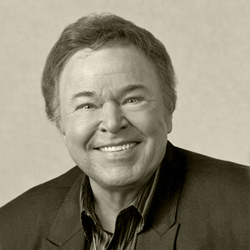
Tommy Allsup
Last, but not least on our list of significant Oklahoma musicians is Cherokee-raised Tommy Allsup, born in Owasso on November 24th, 1931, as the twelfth of thirteen children in total. Unlike many other folks born into musical families and surrounded by the instruments of their choice, Tommy grew up with a single-stringed fiddle, and he experimented with it enough that he was able to play an entire song on just the one string. Thus began his love for music.
He played for dance halls over his youth and sometimes made a few dollars to take home in his hat – and despite the randomness of how he would get paid, he knew that music was what he wanted to do with his life. As a sophomore in high school, Tommy organized a Western-style band called the Oklahoma Swing Billies that ended up playing on local radio.
Later, Tommy Allsup ended up playing with Johnny Lee Wills for many years and continued performing at shows and live on-air. Years later, in 1958, Tommy met Buddy Holly during a session down at Norman Petty Studios. After hitting it off, the two musicians went and toured together at the Summer Dance Party as Buddy Holly and The Crickets and The Tommy Allsup Band.
At the tail end of one of his tours, Tommy Allsup and a few other musicians (including Buddy Holly) were meant to fly to Fargo, North Dakota, on a chartered flight piloted by a friend of Jerry Maguire’s – and they decided with a coin toss who would end up boarding the plane. Tommy ended up losing out, and Buddy Holly, Ritchie Valens, and the Big Bopper hopped on the plane, which, unfortunately, crashed.
“TA: I asked him to go to the P.O. and pick up a letter for me when I wasn’t going to go. He needed some ID to do that. So I was standing there beside the station wagon and I pulled out my wallet. I was thumbing through it for my driver’s license and he said, “Just give me your whole wallet.” He stuck it in his pocket.
JE: So when the plane crashed…
TA: Yes, they found five wallets. There were five IDs and four bodies. They weren’t really sure at first who the IDs belonged to.”
— Tommy Allsup
Chapter 9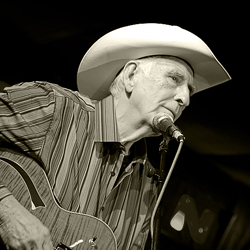
Today, he is credited with being one of the main proponents of Western Swing and is one of the primary influences in modern country music.
Conclusion
In the rich tapestry of Oklahoma's musical heritage, Woody Guthrie, Wanda Jackson, Roy Clark, and Tommy Allsup emerge as pillars of resilience, passion, and cultural impact.
Woody Guthrie's iconic "This Land Is Your Land" encapsulates his journey from a turbulent past to becoming a folk legend, symbolizing the transformative power of art amid adversity.
Wanda Jackson, the rockabilly queen, personifies tenacity and adaptability, from local talent contests to sharing stages with Elvis Presley, leaving an indelible mark on country and rockabilly.
Roy Clark, a virtuoso with roots in Virginia and Oklahoma, not only captivated global audiences but also bridged diplomatic gaps during the Cold War, highlighting the unifying force of music.
Tommy Allsup's fate, decided by a coin toss, cements his legacy as a Western Swing pioneer, emphasizing the fragility of destiny and the enduring impact of an individual on a musical genre.
These musicians, born from the heartland's soil, leave a resonant legacy — a symphony of overcoming challenges, evolving with courage, fostering cultural unity, and showcasing the timeless essence of music that transcends boundaries.


